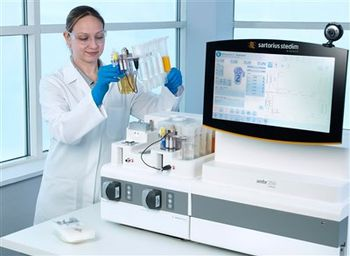
New expandable benchtop workstation with unique single-use bioreactor design offers a simple approach to process development for fermentation and cell culture
Sartorius Stedim Biotech (SSB) introduced the ambr ® 250 modular, an innovative benchtop mini bioreactor system for parallel fermentation or cell culture. This system combines a unique single-use bioreactor vessel and expandable system design to offer bioprocess scientists access to advanced benchtop bioreactor technology for process development.
The new ambr ® 250 modular system consists of a workstation with 2, 4, 6 or 8 single- use bioreactors, with a working volume range of 100 to 250 mL. These mini bioreactors, based on the same stirred tank bioreactors in the well-established ambr ® 250 high throughput system, contain impellers suitable for fermentation or cell culture and show excellent scale up to larger bioreactors. They are also fully integrated with liquid reservoirs and syringe pumps, allowing rapid experimental set up and turn around, thus significantly increasing lab efficiency.
The system brings simplicity to the lab bench. By following three easy steps a bioreactor and all the required accessories can be connected in just a couple of minutes. Once installed, the bioreactor has all the required process services for parameter control, including pH, DO, temperature or agitation. Additionally, feeds can now be delivered with high accuracy from the reagent reservoirs via the syringe pumps into the bioreactor. One control unit is capable of controlling up to eight bioreactor stations independently via an easy to use touch screen user interface.
Mwai Ngibuini, Product Manager at SSB, states: “Our new ambr ® 250 modular provides an excellent single-use platform, which enables rapid process development and optimization for scale-up to larger bioreactors such as BIOSTAT ® pilot and manufacturing scale bioreactors. Utilizing this single-use workflow, will allow bioprocess scientists to improve productivity in their scalable bioprocess development and reduce development time lines, ensuring production of industrial enzymes, biologics and vaccines is more cost-efficient.”
There will be two live webinars on Tuesday July 19, to introduce this exciting new product, and present data on system performance and applications. Bioprocess scientists wishing to join the live webinar, or request a recording, can click here to register.
